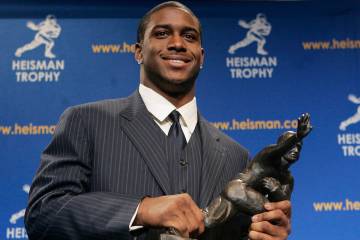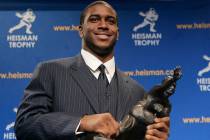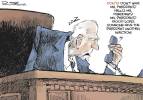Uncertainty ahead as college football moves to a playoff
When Bill Hancock ran the Bowl Championship Series, he was adamantly opposed to a playoff system because he feared it would ruin a regular season he calls “the best in sports.”
Now that he is executive director of the newly created College Football Playoff, Hancock is satisfied that by limiting such a format to four teams, the regular season remains as meaningful as ever.
Wright Waters, the executive director of the Football Bowl Association, hopes so, but he’s waiting for the evidence to come in after next season plays out and a champion is crowned Jan. 12 in Arlington, Texas.
“I think the knee-jerk concern is it’s going to be a negative, but it may be a positive,” Waters said. “It may heighten people’s awareness of college football to another level, and the residual of that will impact the other bowls and take them to a new level also. But the answer is we don’t know. I know in conversations with commissioners that they’re concerned. They’re committed to the bowl system.”
Both executives were in Las Vegas this week for the FBA meetings at Palazzo. Some of college football’s heavy hitters, from Big Ten commissioner Jim Delany to ESPN president John Skipper, took part in panel discussions that addressed the state of the sport and the bowl system’s place in it. The Las Vegas Bowl hosted the meetings.
Fans have long clamored for a playoff system, and the four-teamer — which a committee will select — became the agreed-upon format. Some observers have speculated the playing field will expand to eight and perhaps 16 teams, but the length of the current deal is 12 years.
“We wanted people to know there was stability in the game, and we wanted to have a chance to grow,” Hancock said. “It’s four teams for 12 years, and I do not see it changing. I think it’s wishful thinking (for an expanded field) on some people’s parts. A lot of people want more football, which I totally understand.
“There’s a point in the size of a postseason football tournament where you begin to erode the regular season and you begin to erode the bowl system, and we don’t know where the tipping point is. But I personally think it’s anything beyond four.”
Hancock said he never wanted to tarnish the regular season, where a loss in September could end a team’s national-championship hopes provided it didn’t play in the Southeastern Conference.
Now a team can better absorb such a defeat, though the margin for error remains slim.
For Mountain West schools, talk of playing for a national title remains largely a pipe dream, but Hancock said the opportunity is better than ever. Should Boise State find another Kellen Moore at quarterback and go 13-0, the argument for keeping the Broncos out of a final four might be more difficult to make than under the previous two-team format.
“It absolutely enhances their chances,” Hancock said. “There is no more automatic qualification. Everybody’s on their own to qualify. A playoff is good for everybody in all 10 conferences.”
But it’s the unknown that concerns Waters, who as Sun Belt Conference commissioner saw firsthand how meaningful a bowl appearance is when he informed 8-4 Western Kentucky in 2011 it would sit home. The Hilltoppers also were kept out of the bowl picture last season after posting the same record.
UNLV knows the importance of making the postseason, ending a 13-year drought by appearing in the Heart of Dallas Bowl on New Year’s Day. The Rebels already know they won’t be playing past November next season after failing to meet the minimum Academic Progress Rate score of 930.
The importance of making the postseason is why even with the addition of five bowls next season and an expected total of 40 games in 2015, Waters doesn’t worry much about a saturation.
“There’s a macro number of the total number of bowls; there’s also a micro number of how many bowls does each conference strive to,” Waters said. “So when the Sun Belt Conference strives to four bowls, they’ll fill those four slots.”
Contact reporter Mark Anderson at manderson@reviewjournal.com or 702-387-2914. Follow him on Twitter @markanderson65.




























